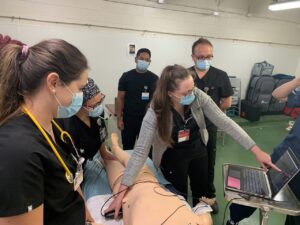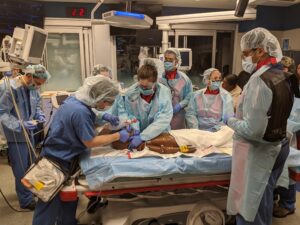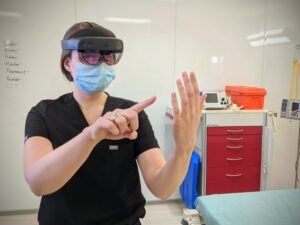Curriculum Overview
Overview
Our 12-month Emergency Medicine Simulation Fellowship is designed to provide comprehensive training in healthcare simulation, preparing fellows to become leaders in simulation-based education. The fellowship covers a wide range of topics, from foundational simulation theory to advanced debriefing techniques and the latest in simulation technology. Fellows will engage in hands-on experiences, research projects, and interprofessional education, ensuring they are well-equipped to enhance patient care and safety through innovative simulation practices.
Curriculum Modules
Module 1: Introduction to Healthcare Simulation
Objectives:
- Define key concepts of healthcare simulation.
- Identify benefits and challenges of implementing simulation in healthcare education.
- Develop a basic understanding of simulation technology and its applications.
Module 2: Ethical Considerations in Simulation
Objectives:
- Recognize and address ethical considerations in healthcare simulation.
- Evaluate scenarios for ethical implications.
- Develop strategies for maintaining a safe and ethical simulation environment.
Module 3: Simulation Design and Scenario Development
Objectives:
- Design effective and realistic simulation scenarios.
- Evaluate scenarios for their educational value and relevance.
- Develop a simulation scenario suitable for specific courses or programs.
Module 4: Debriefing Techniques
Objectives:
- Understand the importance of debriefing in simulation-based education.
- Demonstrate effective debriefing techniques.
- Provide constructive feedback and reflect on personal debriefing styles.
Module 5: Assessment in Simulation
Objectives:
- Explore various methods of assessing learner, facilitator, and curriculum performance in simulation.
- Develop criteria for evaluating simulation-based assessments.
- Create an assessment plan for a specific simulation scenario.
Module 6: Technology in Healthcare Simulation
Objectives:
- Understand the role of technology in healthcare simulation.
- Evaluate the use of different technologies in simulation.
- Incorporate technology into a simulation scenario.
Module 7: Research in Healthcare Simulation
Objectives:
- Understand the current research landscape in healthcare simulation.
- Critically appraise simulation research literature.
- Formulate a research question related to healthcare simulation.
Module 8: Interprofessional Education in Simulation
Objectives:
- Understand the importance of interprofessional education in healthcare simulation.
- Demonstrate effective collaboration in a simulated healthcare setting.
- Develop an interprofessional simulation scenario.
Module 9: Cultural Humility in Simulation
Objectives:
- Recognize the importance of cultural humility in healthcare simulation.
- Incorporate cultural considerations into simulation scenarios.
- Evaluate and adapt scenarios for cultural relevance.
Module 10: Gamification in Healthcare Simulation
Objectives:
- Define gamification and its potential applications in healthcare simulation.
- Evaluate the effectiveness of gamification in simulation-based learning.
- Develop and implement a gamified element in a simulation scenario.
Module 11: Continuous Improvement and Evaluation (System and Personal)
Objectives:
- Understand the principles of continuous improvement in healthcare simulation.
- Develop strategies for ongoing evaluation and enhancement of simulation programs.
- Implement changes based on feedback and assessment data.
Module 12: Capstone Project and Program Integration
Objectives:
- Apply knowledge and skills acquired throughout the fellowship.
- Develop and implement a comprehensive simulation-based educational activity.
- Integrate simulation into the broader curriculum or program.
Join Us
Our fellowship is designed to foster your growth as a leader in simulation-based education. You’ll engage in interprofessional education, ethical considerations, and cultural humility, preparing you to create inclusive and effective learning environments. With dedicated modules on research and continuous improvement, you’ll also have the chance to contribute to the field’s body of knowledge through scholarly projects and quality improvement initiatives. By the end of the program, you’ll be equipped to design, implement, and evaluate simulation programs that enhance patient care and safety.


